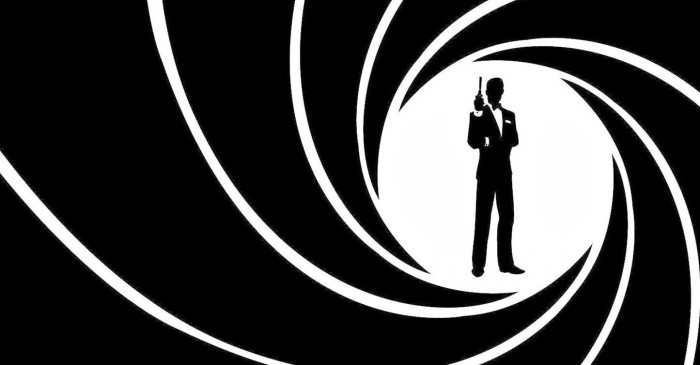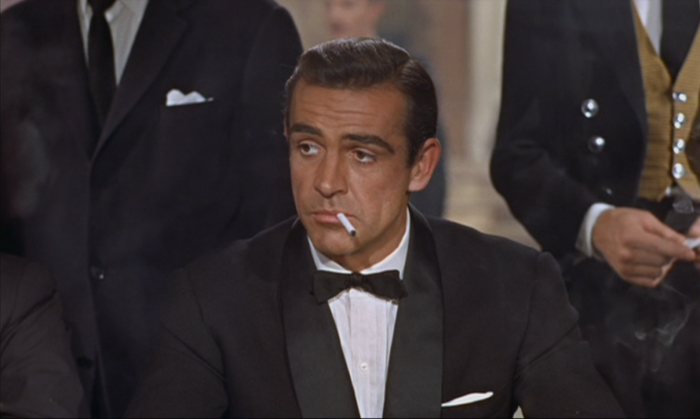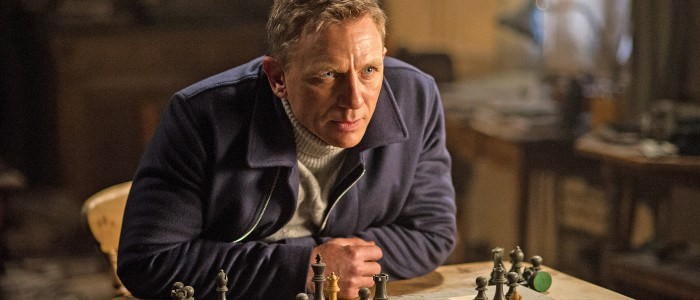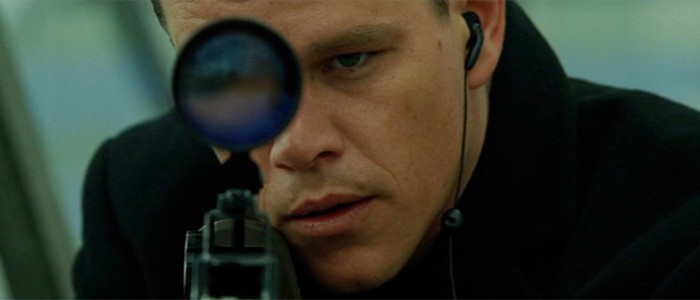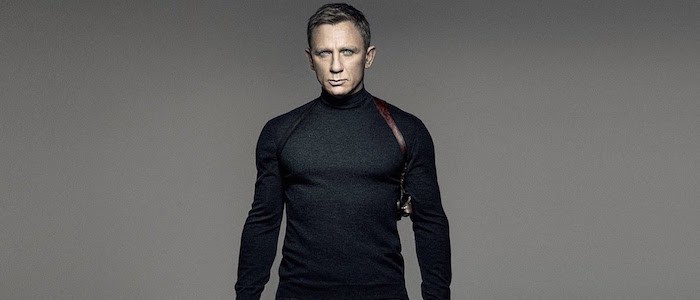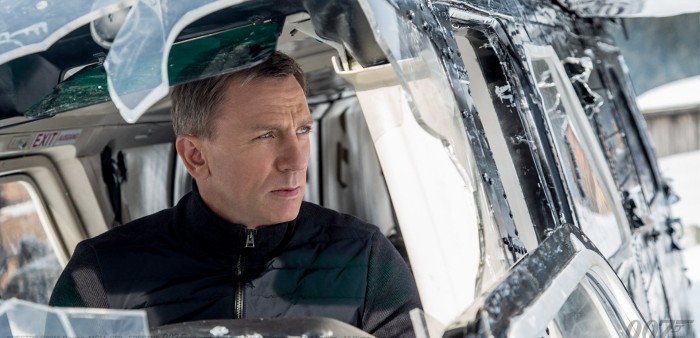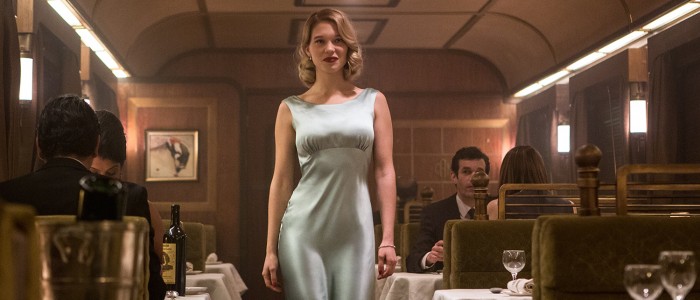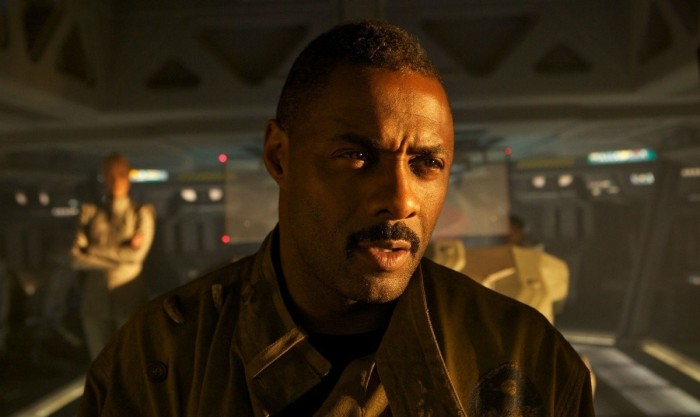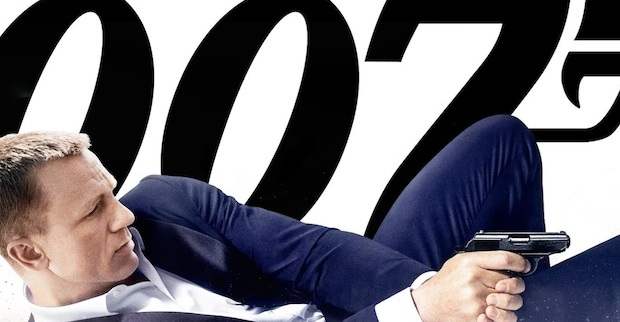Intro-'Spectre'-Ion: Where Does James Bond Go From Here?
Who the hell is James Bond?
That question has been haunting the cinematic landscape for over half a century now, and it's not easy to answer. Like any character who has had ongoing adventures for decades, the specifics of Agent 007 shift with the times. He collects baggage. He absorbs new traits. He reflects what people want out of him. Bond is less of a consistent character and more of a living time capsule – current popular culture stores itself within him, photographs him for two hours, and then catches up with him a few years later for another round.
So who was James Bond? Who is James Bond? Who will James Bond be next? These are the questions fans have been asking for years. Let's try to answer them.
To understand the ongoing appeal of Bond is to understand that he is always changing and always evolving. This is why the bad Bond films often remain watchable and worthy of study. Do you want to know what fashions and musicians and concepts were exciting people in a given year? Pick up the corresponding James Bond movie and take a look.
Right now, we're entering the twilight years of the Daniel Craig era, which has seen 007 deconstructed and re-assembled into something new. We know who the hell James Bond is now – this Bond is what people want out of an action hero in 2015. But Craig may be done. He may have one or two movies left in him. But eventually, maybe in 2018 or maybe 2021, we have to start asking the question again as Bond reflects a new era.
Who the hell is James Bond?
The James Bond of Yesterday
If you only know 007 from his 24 films, you owe it to yourself to pick up one of author Ian Fleming's original James Bond novels. As the product of another era, some have aged poorly. They can be racist, unpleasant, and reflective of an imperialistic attitude that's downright ugly to modern eyes. However, they are also fascinating windows into the mindset of a nation in the middle of an existential crisis, and Fleming had a thing for lurid, pulpy prose that propels you through past the ugly bits.
We have never seen "Ian Fleming's Bond" on screen, although some fans will try to attach that label to Sean Connery and Daniel Craig. The Bond of Fleming's books is a surprisingly ordinary and human hero. He bleeds, he panics, he openly weeps when he narrowly manages to avoid certain death. He's a classic noir hero – a man who has a job to do, even when he's in over his head. He's also stunningly racist and sexist.
But he's also reflective of the times in which he was created. As the British Empire crumbled in the years following World War II, the people of England had to come to grips with the fact that their dominion over much of the world was no more. They would be a handful of islands. James Bond, the English secret agent who got to travel the world, fight foreign menaces, eat exotic food, and make a difference on the global stage was wish fulfillment. It was a novelist creating a character who stood in for Britain's lost dominance. We still matter, these books say.
When Bond leapt to the screen, he stopped being wish fulfillment for the men of a single nation and started being wish fulfillment for men (and boys) all over the world. He was cool, suave, unstoppable, and didn't let anyone stand in his way. He drove cool cars, bedded gorgeous women, wore the best fashions, and had an enviable arsenal of high-tech gadgets. By ditching his direct attachment to the English melancholy that defines the Fleming novels, Cinematic Bond replaced the character's purely British soul with a mirror to the rest of the world.
This is when Bond stopped being a consistent character and started being whatever we wanted him to be. This is why Connery's Bond is an icy, unflappable man's man, perfect for those terrifying early days of the Cold War. This is why Roger Moore's Bond went to space, because everyone loved Star Wars two years before Moonraker. This is why Timothy Dalton's Bond fought drug dealers, because every action hero in the '80s fought drug dealers.
The James Bond of Today
The tone of the Daniel Craig era bubbled up earlier in the series. Both On Her Majesty's Secret Service and Licence to Kill feature a raw, emotionally driven James Bond who feels pain and takes things personally. George Lazenby was doing the Daniel Craig thing 20 years before Timothy Dalton was doing the Daniel Craig thing 20 years before Daniel Craig was doing his thing. Whew.
However, those films were financial failures in their time and it may have been because they simply arrived a few decades too early. The events of September 11, 2001 hit cinema like a freight train. Audiences didn't, and couldn't, look at movies in the same away again. Suddenly, the slick and bombastic Pierce Brosnan films looked archaic. His Bond reflected the easygoing attitude of the post-Cold War era, a decade where much of the western world found itself relaxed and happy and comfortable and just wanting to have a good time at the movies. When Die Another Day arrived in 2002, it looked ancient and sad, a movie made before we had the world snatched out from underneath us.
Much has been been written about the post-9/11 action hero. Matt Damon's Jason Bourne and Christian Bale's Batman became the ideal: tortured, lonely, broken men who are forced to overcome trauma to win the day. And when they do win, they also lose. A loved one dies. They're framed for a crime they didn't commit. Things only get worse. This kind of mentality in a big blockbuster action hero felt unusual at one time. Now, it's commonplace. It's expected that our movie heroes be sad, broken, disillusioned people. Even Captain America is bummed out all the time.
And Bond, being the mirror that reflects and absorbs all surrounding culture, became what people wanted. Daniel Craig's Bond is an astonishing character, but he is also a direct riff on the movies surrounding him. Casino Royale wears its Bourne Identity influences on its sleeve and Skyfall contains shades of Christopher Nolan's The Dark Knight trilogy. Craig's James Bond is cool, but you get the impression that he'd do anything to stop being cool, to escape his life of blood and violence and regret. He's the most sensitive of the Bonds, a man with total self-awareness. He does what he must and the men and women in his life suffer for it.
Previous Bonds racked up pretty big "friends and lovers" body counts, but it was easily brushed off – Bond forgot about it a scene or two later. Craig's Bond remembers. Since the 007 series is currently reflecting and absorbing the strict continuity that has made the Marvel movies such a hit, we get to see this Bond remember throughout his entire run. The shadow of Vesper Lynd, who perished in Casino Royale, lingers over Spectre like a, well, you know.
Whether we want to admit it or not, the tortured hero who goes above and beyond only to return home to an empty apartment and a bottle of vodka is what we want these days. It's tragic, but it's also romantic in the classic sense of the word. The old Bonds, the flippant, fun-loving adventurer of the Moore years and the hardcore symbol of masculinity of the Connery years, feel older than ever. They're relics (albeit ones that remain fun to watch). Daniel Craig's Bond films dare to ask "What good is a hero if that hero isn't suffering? What good is a victory without sacrifice?"
The James Bond of Tomorrow
If each iteration of James Bond and each James Bond movie so clearly defines its era, it is the duty of any Bond historian to look to the future and wonder "What's next?" The Craig era has been successful enough that many of his definitive traits should carry on through at least the next actor. For the next decade or two, Bond will be all too human and all too sad about it. But the details will be modified. The little things will get moved around. Bond will continue to reflect the changing times.
People have lost fortunes trying to predict the future, but why don't we try anyway? What does the James Bond of tomorrow look like?
Bond and Current Events
James Bond will continue to be a sensitive guy who accumulates guilt and pain like a sponge absorbs water. In an era where we have seen too many soldiers come home broken from wars, we cannot accept a James Bond who's totally okay doing the things that he has to do. The internet and mass media have pulled the curtain off of war. Any lingering fantasy is gone. The romance has been splintered. However, our admiration for the men and women who put their lives on the line has only grown, so James Bond will live on in a similar vein as the guy who suffers for us.
It's no accident that Spectre not-so-quietly touches on concepts like mass surveillance and drone warfare. When people-at-computers seem to be running the world, we'll always trust the guy who actually has his feet on the ground. As conflict continues to be defined by drones flown from stateside military bases, expect to see Bond treated as the voice of reason, the guy who does what a satellite or a computer or a remote-controlled missile cannot.
Bond and Gender
Speaking of sensitivity, expect to see Bond's relationship with women continue to evolve. In the old days, Bond was a regular sex machine, screwing everything that moved without thinking twice (and hardly blinking when the women he bedded met unfortunate ends). However, Bond's dinosaur ways are, ahem, problematic by modern standards. In 2015, you cannot fuck a lesbian straight, as Bond does in Goldfinger. Some of the sexuality in older Bond movies is downright uncomfortable by modern standards. It's ugly stuff made uglier when viewed through a modern lens. In an age where online threats against women are a daily issue, Bond treating his "Bond girls" like disposable garbage no longer feels like something the ideal hero of our age should do.
And that's why Bond's genuine romance with Vesper feels so vital. That's why Lea Seydoux's Spectre heroine has so much control of her own life and sexuality. It's why Moneypenny is now a capable agent and ally, not just the secretary Bond flirts with on the way to see M. There is still a long way to go to fully retool Bond's sexist ways (Daniel Craig himself has not been above labeling the character a misogynist), but the past four films have seen the female characters of this series take a massive leap in importance and depth. The last time we've seen such empowered and well-drawn female characters was in 1969, when Diana Rigg's Tracy Draco won Bond's heart before shattering it. Even if Bond always remains slightly sexist (and that may be a trait that never gets scrubbed away), the movies will continue to present him with capable female allies and enemies to throw his nonsense back in his face.
So let's use that as a cue to jump to another talking point that has been making the rounds recently: could James Bond be a woman? As someone who prides himself on being an open-minded 007 fan who takes everything this series does in stride, I'm going to say no. It won't happen. I'll even go further and say that it shouldn't happen. Through all of the years and all of the changes, one thing has remained consistent about James Bond – he's a portrait of idealized modern masculinity. In the '60s, that meant cool suits and a cooler attitude. In 2015, it's trickier than that. The ideal modern man is more in touch with his feelings, less afraid to let women take charge, and more aware of the consequences of his actions. What a man should be, or rather, what society thinks a man should be, is always reflected in Bond. As a document tracking the progress (and occasional non-progress) of the human male, these movies have been invaluable. Change his gender and you may have a cool spy... you just wouldn't have James Bond.
Bond and Race
However, you could change Bond's skin color and nothing would change at all. We will likely see a black James Bond within our lifetimes. It probably won't be the next Bond (and sorry, it certainly won't be Idris Elba), but the Bond after that probably won't be a white guy. Bond's imperial wish-fulfillment days are 50 years dead. Fleming's Bond, the Bond who had to be a white guy, is gone. There are two groups of people who would be opposed to a black Bond: obsessive weirdos who are convinced that all Bond movies are one continuity (and a black actor would shatter that delusion), and racists. As he is presented now, by Craig, there is nothing about Bond's character that is defined by his skin color. As long as he's British, Bond can be any race.
A certain segment of Bond fandom will complain loudly about this when it inevitably happens, but they will be drowned out by the rest of the world. You know, the people who are too busy going to see movies with multi-racial casts like Furious 7 and Star Wars: The Force Awakens. The world owns James Bond and the world isn't white. It's time.
Bond and Sexuality
As Bond continues to reflect that changing tastes and feelings of the world, his sexuality may get an adjustment or two. LGBT rights remain a hot topic all over the world, but the needle is shifting, slowly but surely. As the younger generations take control and the old bigotry crumbles away, the Bond producers of the future will simply realize that it's time for Bond, a character who has always been linked to sex, to take things to the next step. If Bond continues to reflect the changing real world (and you should know this by now – he always does), he'll eventually have to exist in a world that is mostly cool with gay, lesbian, and transgender people. We'll probably never see a gay Bond, as some have suggested. The character is too defined by his relationship with women for that to happen. However, the only spy more effective than one willing to sleep around to get the job done is a spy willing to sleep with anyone to get the job done. A bisexual James Bond would literally be twice as good at his job as a straight James Bond.
If you scoff at this, just remember the scene in Skyfall where James Bond plays gay chicken with Silva and wins. Hell, you can cut the sexual tension between Craig and Ben Whishaw's Q with a knife. Like it or not, Bond's sexual horizons are opening up. The secret agent famous for sleeping with any woman that moves will, eventually, sleep with anyone that movies. it may take a few more Bond actors and a few more decades, but it feels inevitable.
So where does Bond go from here? A bisexual, black Bond who feels bad about his job. That's where we're heading, if current trends converge. And it wont be a big deal because Bond has never stopped changing and will never stop changing. He will outlive us all, assuming new identities and reflecting new qualities until the sun burns out and human civilization crumbles into dust. That's always been the appeal of James Bond, 007.

